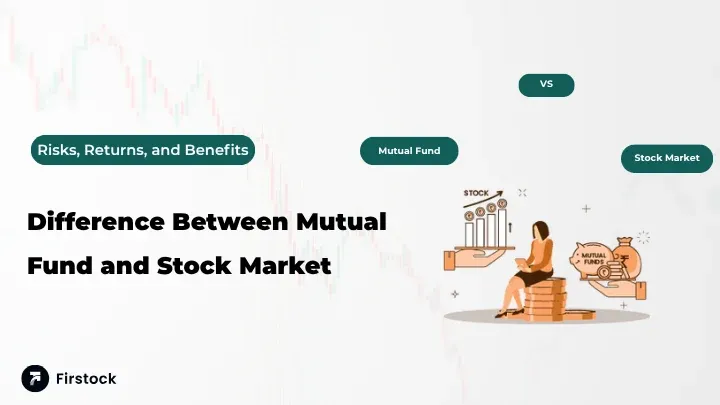Difference Between Mutual Fund and Stock Market

Difference Between Mutual Fund and Stock Market: Complete 2025 Guide
When someone in your family talks about investing, chances are the conversation quickly drifts toward mutual funds or the stock market. These two words are so common in India now that they almost sound interchangeable. But they’re not the same thing. In fact, the difference between mutual fund and stock market is one of the first things any new investor should understand before putting money in.
Investing is a lot like traveling. Picture mutual funds as those big, cheesy tourist buses. Somebody else is behind the wheel, you’re stuck on their schedule, and yeah, you gotta share the ride with a bunch of strangers. Sure, it’s not wild or anything, but you’ll probably get where you wanna go without too much drama.
Now, going solo in the stock market? That’s more like jumping in your own car. Wanna take a shortcut? Floor it. Feeling paranoid? Hit the brakes. You call the shots—every twist, every turn. It’s way more thrilling, but man, it can wear you out if you’re not paying attention. Not for the faint of heart, honestly.
So, What Exactly Are Mutual Funds?
Most of us have heard that catchy line on TV: “Mutual Funds Sahi Hai.” But what does it actually mean?
At the most basic level, a mutual fund is a pool of money collected from thousands of people. This money is then invested by a professional called a fund manager into a basket of assets—stocks, bonds, or a mix of both.
Here’s an easy way to picture it. Imagine 50 people in your colony all want to invest but don’t have the time or expertise to pick individual shares. So they each chip in money, and the group hires an expert to manage the pot. That expert studies markets, checks company balance sheets, and decides where to put the money. In return, everyone gets a proportionate share of the profits (or losses).
In India, mutual funds are extremely popular because they’re beginner-friendly. You can start with a SIP (Systematic Investment Plan) of just ₹500 a month. You don’t need to keep track of market news every day. And you get instant diversification—your money isn’t stuck in just one or two companies, it’s spread across many.
There are different flavors of mutual funds too:
>Equity funds – mostly invest in company shares.
>Debt funds – safer, as they focus on bonds and fixed-income securities.
>Hybrid funds – a mix of equity and debt.
>Index funds – mimic popular indices like Nifty 50 or Sensex.
All mutual funds in India are regulated by SEBI (Securities and Exchange Board of India). That means you get regular updates about where your money is invested, the Net Asset Value (NAV), and the charges involved. For ordinary investors, this brings a lot of peace of mind.
And What About the Stock Market?
Now let’s talk about the other side of the coin: stock market investment.
When you buy shares directly on the stock exchange—be it Reliance, HDFC, Infosys, or Tata Motors—you’re becoming a part-owner of that company. That’s what stock market investment really means. Even if you own just one share, you technically have a small slice of ownership.
But unlike mutual funds, there’s no one holding your hand here. You decide which stock to buy, how much to invest, and when to sell. That freedom is thrilling to many investors. The flip side? It comes with more responsibility and, yes, more risk.
Think of it like cricket. Buying a mutual fund is like watching from the stands—your team is playing, and you cheer when they win. Buying stocks directly is like stepping onto the pitch. You face the bowler yourself. If you time your shot well, you could hit a six. But a wrong move, and you could be bowled out.
Trading in the stock market means keeping an eye on earnings reports, government policies, RBI rate changes, and even global cues. A small change in U.S. interest rates, for example, can shake up the Indian market in minutes. For some, this constant buzz of news and data is exciting. For others, it feels overwhelming.
Mutual Funds vs Stock Market: The Core Difference
The heart of the difference between mutual funds vs stock market lies in how much control and involvement you want.
With mutual funds, you hand over control to a professional manager.
With stock market investments, you’re the one in charge, making all the calls.
Here’s another everyday example. Let’s say you want to eat biryani. Buying into a mutual fund is like ordering from a reputed restaurant. A trained chef selects the ingredients, cooks the dish, and serves it to you. Buying from the stock market, on the other hand, is like cooking the biryani yourself. You pick the rice, spices, and meat, and decide how long to cook it. The meal could turn out amazing—or it could flop—depending on your skills.
Here’s a quick comparison in table form:
A Simple Money Example
Let’s make this crystal clear with an example.
Suppose you’ve saved up ₹20,000.
>If you put that money into a mutual fund, the fund manager might spread it across 30–40 companies. So even if one sector (say IT) dips, other sectors (like banking or pharma) may balance things out.
>If you put the same ₹20,000 directly into the stock market, you might only afford 3–4 stocks. If even one of those crashes, your entire portfolio takes a big hit.
That’s why so many Indian investors combine the two—mutual funds for stability, stocks for higher risk and higher reward.
Why Do People Choose Mutual Funds?
One word: convenience.
Life in India is busy—managing jobs, kids, family, side hustles—it’s tough to sit and track market charts every day. With mutual funds, you hand over the responsibility to an expert.
Here’s what attracts most people:
>Professional expertise – A trained fund manager makes the tough calls.
>Diversification – Your money spreads across industries.
>Flexibility – Start with SIPs or lump-sum investments.
>Transparency – Thanks to SEBI, you know where your money is.
It’s no wonder that SIPs are now a part of daily conversations. These days, you’ll often hear someone say proudly: “Main ₹5,000 ka SIP karta hoon every month.” It’s the modern version of a piggy bank.
Why Do People Choose Stocks?
For some investors, nothing beats the thrill of the stock market.
They love researching companies, reading balance sheets, and tracking government policy. They enjoy being in control and making independent decisions. Direct ownership of stocks also gives you unique benefits like:
>Dividends (a share of company profits)
>Bonus shares
>Stock splits
For example, people who invested in Infosys shares in the 1990s and held on have seen their wealth grow exponentially. Stories like these are what keep investors hooked.
But here’s the catch—if you buy shares blindly, just based on tips from friends or social media, you could lose money very fast. The stock market rewards discipline and research, not guesswork.
Mutual Funds Investments vs Stock Market: Pros and Cons
Let’s make it simple:
Mutual Funds Pros
>Easy to start (SIP from ₹500).
>Managed by experts.
>Built-in diversification reduces risk.
>Ideal for long-term goals like retirement or education.
Mutual Funds Cons
>You pay a management fee (expense ratio).
>No control over exact stock selection.
>Returns may feel “average” compared to hot stocks.
Stock Market Pros
>Full control over your money.
>Potentially higher returns if you pick winners.
>Can sell anytime during market hours.
>Direct benefits like dividends.
Stock Market Cons
>Higher risk if you don’t diversify.
>Requires constant monitoring.
>Emotional rollercoaster—easy to panic-sell.
>Needs solid financial knowledge.
The Indian Investor’s Reality
In India, the journey usually goes like this:
>Many people start with mutual funds because they’re safe, regulated, and easy.
>Once they gain confidence, some experiment with stocks to chase higher returns.
>Others do the reverse—burn their fingers in stocks first, then return to mutual funds for peace of mind.
The mutual fund SIPs have been one of the most popular investment options over the last decade, which has also been reflected in their growing popularity in the smaller cities of Tier 2 and Tier 3. Simultaneously, the advent of low cost brokerages like Zerodha and Groww has not only made the stock market more accessible but also simplified the process of investing.
Long term vs. short term.
While talking about the difference between direct stock market and mutual fund investments, the time horizon is the major distinguishing factor. Mutual funds are considered the most appropriate option for long term objectives like purchasing a house, retirement planning, and saving for kids' education. Their planned, diversified approach is very compatible with such longer durations.
Contrarily, direct stock market investments are generally seen as money making schemes of the short term timespan or quick riches strategies. Nevertheless, many investors keep their stocks for a long time, and stocks remain the core part of their portfolios. Lastly, the decision of selecting between the two just hinges on the factors of risk tolerance, discipline, and patience.
Common Myths in India
Let’s bust a few myths:
“Mutual funds are risk-free.” Wrong. They do carry risk, but generally less than direct stocks.
“You need lakhs to invest in the stock market.” Not true. You can start with just a few hundred rupees, though diversification is harder with small amounts.
“Mutual funds guarantee fixed returns.” Also false. Returns depend on market conditions.
Wrapping It Up
In the end, the variance between the stock market and mutual funds is not about which is superior. Those individuals who possess strong analytical skills and are willing to personally handle their portfolios, normally, are the ones that achieve the biggest successes through direct equity investing. Moreover, the market in India, seasoned investors, are relying heavily on a combination of both tactics.
They put their money in mutual funds to have stable capital increase and at the same time acquire stocks for more profitable returns. Such a technique assists in not concentrating too much on an individual asset class while at the same time efficiently managing the risk and exploiting the market.It’s about what suits you.
>If you prefer steady, hands-off investing → Mutual funds are your best friend.
>If you enjoy research, risk-taking, and being in control → Stock market investing might be your game.
The smartest Indian investors often use a mix of both:
>Mutual funds for long-term wealth creation.
>Stocks for direct ownership in companies they strongly believe in.
In short, whether you hop on the tourist bus (mutual funds) or drive your own car (stocks), the goal is the same—reaching your financial destination safely and successfully.
FAQs
1: What is the main difference between mutual funds investments and stock market?
>In the stock market, you directly buy company shares.
>In a mutual fund, your money is pooled and managed by a professional.
2: Which is safer—mutual funds or stock market?
>Mutual funds are generally safer because they’re diversified. But both carry risks.
3: Can I invest in both?
>Yes. Many investors balance their portfolios with both.
4: Do mutual funds give higher returns than stocks?
>Not necessarily. A single stock might outperform a fund, but it can also underperform.
5: Do I need a Demat account for mutual funds?
>No. Mutual funds can be bought directly, but stocks require a Demat account.
6: Are mutual funds better for beginners?
>Absolutely. They require less monitoring and are a safer entry point.





